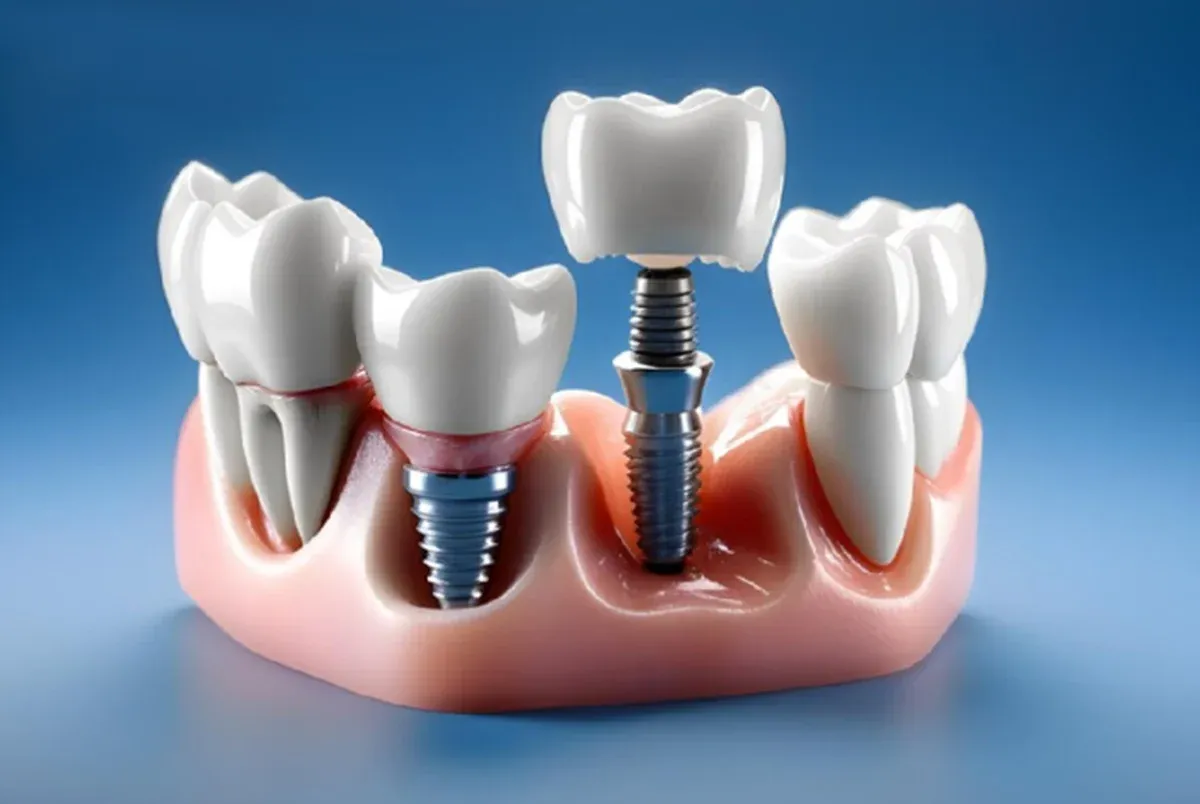Although highly effective in restoring missing teeth, dental implants may be associated with certain complications. Postoperative issues can include infection at the implant site, mainly if meticulous oral hygiene practices are not maintained. Inadequate care can lead to the development of peri-implantitis (implant inflammation).
Patients with compromised immune systems or systemic health conditions may face a higher risk of infection. Additionally, nerve damage is a rare but potential complication during implantation, resulting in sensations like tingling or numbness in adjacent areas.
Long-term complications can manifest as peri-implantitis progresses, leading to bone loss around the implant and potential implant failure. Insufficient integration with the surrounding bone or inadequate bone density can pose challenges, affecting the stability and success of the implant.
Addressing dental implant complications involves a multi-faceted approach. Regular dental check-ups, stringent oral hygiene practices, and addressing systemic health concerns are essential solutions for implant issues. Also, they help in managing implant challenges and ensure their long-term success.
“Preventing complications in dental implants is the art of foresight. Craft your smile’s future with proactive care, and complications will find no room to linger”.
Understanding Dental Implant Complications
It’s essential for individuals who are considering or undergoing dental implants to understand the potential complications that may arise. Although dental implants provide an excellent solution to replace missing teeth, they require careful attention and proactive management. In this blog, we’ll discuss these complications to enlighten you.
- Peri-Implantitis:
Peri-implantitis results from inadequate oral hygiene practices, creating an environment conducive to plaque and bacteria accumulation. The inflammatory response not only jeopardizes the implant’s stability but, if neglected, can potentially lead to bone loss. It also poses a significant threat to the success of dental implants.
Insufficient oral hygiene practices play a pivotal role in the development of peri-implantitis. When plaque, a biofilm of bacteria, accumulates around the implant, it triggers an inflammatory process in the surrounding tissues. This inflammation compromises the structural integrity of the implant and may extend to the supporting bone. Consequently, individuals with dental implants must prioritize meticulous oral care routines that include regular brushing, flossing, and professional dental check-ups.
- Nerve Damage:
Though rare, nerve damage during dental implant surgery can lead to sensations like tingling or numbness in nearby areas. It happens if the nerves in the oral region are accidentally affected during the procedure. To avoid this, precise surgical techniques and thorough preoperative assessments are essential.
The potential effects of nerve damage go beyond immediate discomfort. Patients may experience altered sensation or even loss of function in the affected areas, which can impact their daily lives. To minimize this risk, communication between patients and dental professionals is crucial.
Preventing nerve damage during dental implant surgery is vital for the individual’s comfort and oral health. It requires careful planning, specialized techniques, and transparent communication between the patient and dental professionals.
- Poor Integration and Insufficient Bone Density:
This complication involves challenges in successfully fusing the implant with the surrounding bone. When the bone fails to adequately support the implant due to insufficient density or other related issues, it can have profound consequences for an individual’s oral health.
Insufficient bone density poses a significant hurdle in the initial stages of dental implantation. For a successful implant, the bone must be strong enough to support the implant’s integration. Also, it should withstand the forces exerted during normal chewing and biting. In cases where the bone lacks the necessary density, the implant may struggle to establish a sturdy connection, potentially leading to instability.
The effects of poor integration and insufficient bone density extend beyond the immediate discomfort. Individuals may experience difficulties in chewing, speaking, or engaging in regular activities involving the jaw. Additionally, implant instability increases the risk of implant failure over time, requiring additional interventions and potentially impacting adjacent teeth.

This complication may result in the need for additional procedures to enhance bone density, such as bone grafting. This procedure involves transplanting bone tissue to the deficient area, providing better support for the implant. However, these supplemental procedures can prolong the treatment process and introduce additional complexities.
Before placing dental implants, it is crucial to thoroughly evaluate the patient’s oral health to prevent issues like weak integration and insufficient bone density. This evaluation involves carefully assessing the quality of the available bone, considering factors such as density and volume. For deficiencies, appropriate measures like bone grafting may be necessary to fortify the implant’s foundation.
- Implant Failure:
Implant failure, though relatively rare, can occur due to various factors. It may result from poor osseointegration, where the implant doesn’t correctly fuse with the surrounding bone. It happens if the patient has compromised bone quality, inadequate healing time, or systemic conditions affecting bone metabolism.
Additionally, factors like excessive loading on the implant, poor surgical technique, or material issues can contribute to implant failure. A comprehensive patient health assessment, proper treatment planning, and adherence to postoperative care guidelines are critical in preventing implant failure.
- Allergic Reactions:
While uncommon, allergic reactions to implant materials can pose complications. Titanium, commonly used in implants, is generally biocompatible. However, in rare cases, patients may exhibit hypersensitivity reactions. Symptoms may include inflammation, discomfort, or even implant failure. Thorough patient history assessments and, if needed, alternative materials help mitigate the risk of allergic reactions.
- Mechanical Complications:
Mechanical complications may arise from issues like abutment or screw loosening, fractures, or prosthetic component malfunction. These challenges can impact the stability and function of the implant. Regular follow-ups, timely adjustments, and using high-quality prosthetic components can help minimize the risk of mechanical complications.
Addressing Dental Implants Complications:
Handling potential issues with dental implants requires a strategic and comprehensive approach. Here, we’ll discuss the solutions for implant issues to ensure lasting success and a confident smile.
- Thorough preoperative assessments become paramount to mitigate challenges related to poor integration and insufficient bone density. Comprehensive evaluations of the patient’s oral health, including advanced imaging for bone density assessments, allow for a precise understanding of the bone’s condition. In cases of inadequate density, bone grafting procedures are an effective intervention.
- Transparent communication between patients and dental professionals is central to addressing potential nerve damage concerns. Establishing an open dialogue helps understand and mitigate nerve sensitivity risks. Meticulous evaluations of the patient’s medical history, focusing on nerve-related sensitivities, guide the development of a tailored treatment plan. Collaboration with oral surgeons skilled in nerve-preserving techniques minimizes the potential for nerve damage and ensures a comfortable experience for the patient.
- Preventing and managing peri-implantitis involves a dual patient education approach and comprehensive treatment. To prevent plaque buildup, it is imperative to instruct patients on oral hygiene, including regular brushing, flossing, and professional cleanings.
- Early intervention through regular dental check-ups allows for the timely detection of peri-implantitis, enabling professional cleaning and, if necessary, antibiotic therapy. A comprehensive treatment approach addresses the infection and any contributing factors, ensuring the long-term success and stability of dental implants.
- A detailed examination of the patient’s general health is essential to identify potential factors contributing to dental implant failure. Understanding patient-specific conditions allows for tailored treatment plans and mitigates risks. Adherence to postoperative care guidelines ensures the longevity and success of dental implants.

- Dealing with potential allergic reactions involves meticulous patient history collection, focusing on known allergies or sensitivities. Alternative implant materials may be considered for patients with identified sensitivities, ensuring a personalized and safe approach to dental implant treatment. This patient-centric strategy minimizes the risk of adverse reactions and contributes to a positive and individualized experience with dental implants.
Final Thoughts:
Handling potential issues with dental implants requires a multi-faceted and patient-focused approach. It involves various elements such as prevention, early intervention, and personalized care. All these elements help ensure the overall success and longevity of dental implants. A comprehensive treatment approach is also essential in managing implant challenges such as implant failure. Thorough assessments of the patient’s overall health help identify potential factors contributing to implant failure.
Following postoperative care guidelines is crucial for proactively ensuring the durability and success of dental implants. It includes maintaining oral hygiene, avoiding overloading implants, and scheduling regular dental appointments.
Contact your Pinole dentist, Dr. Azadeh Hosseini, DDS, or Ghazal Hosseini, DDS, at Top Pinole Dental to learn more about Complications and Solutions: Handling Potential Issues That May Arise with Dental Implants.
Resource:
How Dental Implants Are Changing Lives?
*This media/content or any other on this website does not prescribe, recommend, or prevent any treatment or procedure. Therefore, we highly recommend that you get the advice of a qualified dentist or other medical practitioners regarding your specific dental condition.*
1500 Tara Hills Dr., Suite 104A, Pinole, CA 94564
Monday – Saturday 8:00 AM to 5:00 PM
